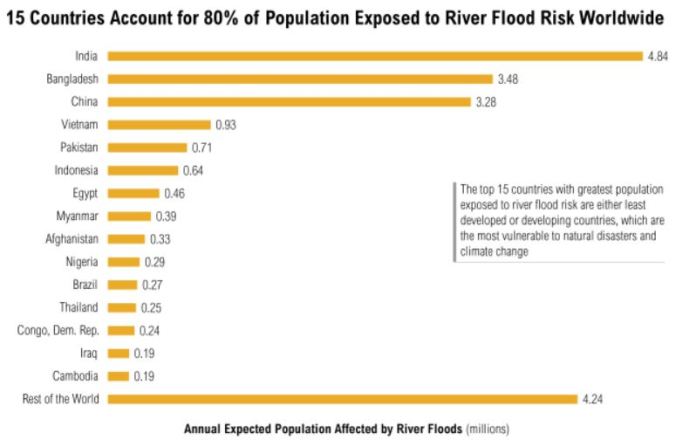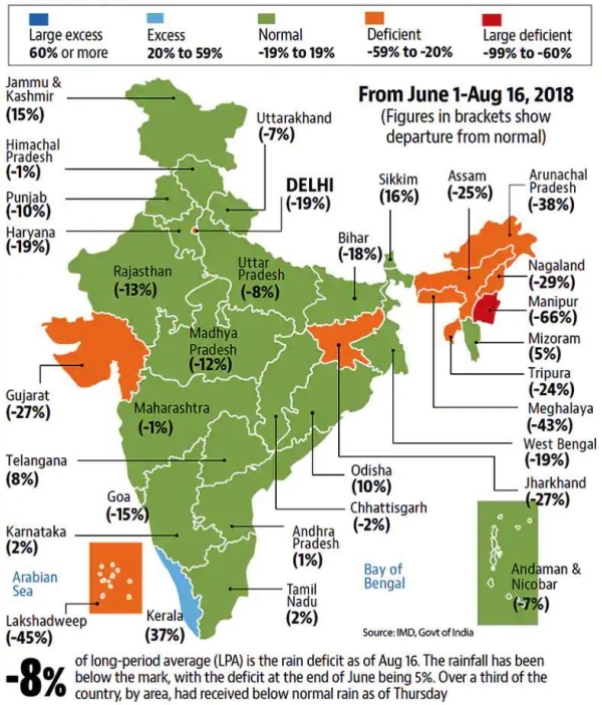As per a news source:
“As many as 107,487 people died due to heavy rains and floods across India over 64 years between 1953 and 2017, according to Central Water Commission data presented to the Rajya Sabha on March 19. Damage to crops, houses and public utilities was reported to be Rs 365,860 crore — or as much as three per cent of the country’s current GDP — the data shows”.
India, a country flooded every year with a vast variety of protests and demonstrations but does not witness a protest or demonstration concerning floods. Professional or full-time protesters, NGOs, Environmentalists, self-proclaimed intellectuals and many more can discover reasons to protest in anything; demonstration for reservation, movie scene, somebody’s extra comments or somebody’s missing comments, Tomato/Onion prices or even imaginary aspects like an undeclared emergency, and so on. But how many protests did we see highlighting foundering drainage capacity, haphazard reservoir regulation and incompetent flood control structures deemed as vital antecedents for floods? Have you seen candlelight march for the people died during floods? Why is this so? A question we should be asking ourselves.
In fact, the irony of the situation is that a 100% literate state like Kerala that just bore the brunt of a flood tragedy participates in a demonstration “Bharat Bandh” targeting weakening of Indian currency. It is an irony because it is one state that benefits the most from a weak Indian currency. The state receives foreign remittances worth more than one-fifth of the state’s GDP. To put it succinctly, they protested against their own benefit, the money that will be useful in rebuilding the state could be reduced drastically if the government listens to them.
What can conceivably be a better measure of the level of ignorance on the part of citizens of world’s largest and fully functional democracy? If there exist any such measures Indian protesters would stand tallest.
What can be done about this? Merely criticizing what is happening won’t solve any problem. Would it? First and foremost, before jumping to the solutions, we need to acknowledge the problem. So far we don’t even see or rather want to see it is as a problem that we can actually fix.
How do you react when your tiny toddler spoils your telephone directory with his/her priceless modern art? How long do you play along when he with his glittering eyes along with gestures with tiny, little hands covered with different crayon colors, try to reason in his shaking soothing voice that a “coloring fairy” flew in and did the drawing with her wings? What do you do? Maybe for once, you let it go, but by any means preferable, by stories or actions, the message is conveyed that he isn’t supposed to draw on any flat surface that looks like a sketchbook. If you continue buying whatever child offers then, as the child grows the “coloring fairy” morphs into a “biased teacher” who sets up of syllabus question paper and then to an “imperfect system” or an “ineffective government” and even to the “mother nature.”
Isn’t it the exact same situation now? As soon as floods are spoken of “angry mother nature” is held accountable for the disaster. Its nature’s fury punishing mankind for its sins. As and when Climate Change or Global Warming are introduced in the discussion, the discussion diverges to a path which ends up in a technology vs nature debate. Since in this high-tech century neither you nor I can survive without technology, we drop the ball.
Is it true? Can we do nothing to avoid floods? What do you think?
I think we definitely can and in fact a lot of countries are already achieving success in their flood control endeavors. World Resource Institute says that 15 countries account for 80% of the population exposed to river flood risk worldwide. Somehow the “Global” issue does not affect the developed countries have a look:

Further, India also lists in the list that indicates the countries whose GDP is impacted by floods noticeably.

Simply the fact that other countries especially the more developed & technologically advanced ones are able to control these issues, indicates that we can do too. But first, we will have to stop hiding behind “Global Warming is the root cause of all the issues” mannequin. Once we are on the same page and agree that we can and we should make efforts to control floods at least most of them, we have already taken our first step in this direction and can move forward.
Flood types like coastal floods, hurricanes or tsunami, etc. are rare in India. Most of the floods occur because of overflowing rivers due to excess rainfall. Therefore, this should be our utmost priority. In one line, currently we are not able to get rid of the huge amount of extra water without destroying the place. The peculiar aspect of rainfall in India is that when one part is flooding the neighboring state is witnessing a drought-like situation (Jharkhand & Odisha as an example). This is how the monsoon behaves in India.

River interlinking through artificial methods seems a reasonable way to avoid floods and droughts. But since the professional protesters pay more attention to “who” rather than “what” the scheme gets overshadowed because of the people who push it. The Indian National Congress’ president Mr. Rahul Gandhi said in 2009 that the entire idea of interconnecting of rivers was dangerous and that he was opposed to interlinking of rivers as it would have ‘severe’ environmental implications. A lot of other popular personalities, writers, environmentalists claim interconnecting rivers would submerge hectares of land under water along with displacing a large number of people. Isn’t exactly the same happens when it floods? Aren’t people in Kerala displaced? Isn’t the land there submerged under water? Shouldn’t people be asking these questions to those popular personalities now? Drought and floods at the same time, doesn’t it sound weird? With 42% of the country receiving deficient rainfall and is staring at the drought-like situation, could different artificial canals interconnecting different rivers have prevented floods in Kerala?
Isn’t prevention better than cure?
Sweet rainwater is a boon and should at no cost be wasted, especially when there are cities and states struggling for drinking water. We are at fault when we are unable to build a system robust enough to use this boon. It is a shame for us that in a high-tech century where we are capable of transporting anything anywhere, we are incapable of transporting water from one state to another. It is also not that we cannot; it is solely that we don’t think we should. We have different set of priorities, like becoming a certified backward community and joining the list of distinguished freeloaders. Caste System is portrayed as one of the gravest social issues in India. How many people in India are displaced due to Caste issues? Haven’t Floods caused more damage to India, its reputation, its growth, its people so on and so forth than the castes issues? I am reasonably confident if floods were associated with any caste or community or to say “a vote bank”, there would not have been a single person suffering because of them.
If you are a humanitarian, think about the people who lost their lives, loved ones in the floods which could have been avoided. The amount of distress they went through in the relief camps. Your charity/donations help you more than it helps them; can it bring the lives or lost crop or the lost time back? If you are money minded, think about the billions that were washed, which could have been used for creating something new and useful.
There is no dearth of creative people in India; there can be a countless number of ways different rivers could be connected, not only surface canals but also something like underground tunnels. Infusing artificial intelligence in water resource management and eventually getting rid of human dependency could prove more accurate, precise, efficient and error free. This is an opportunity, an opportunity to engage the youth of the country in a constructive & productive activity; an opportunity to raise the standard of living; an opportunity to create employment. A wide variety of skills would be required to build a robust system; PhD/Master thesis topics, industrial research, whitepapers, architecture designs, feasibility analysis and so on and so on. There will be different solutions for different places, by the time that one feasible solution is realized after scurrying through tens and hundreds of different ideas, several other problems would have been solved. We don’t have to do everything today, but we have to change our approach. Protests are not only to burn the nation; they can be used in a constructive manner as well. People should wake up from their shackles of slumber and start pushing the authorities towards these kinds of activities. Democracy is not just a license to shout out loud. It is a big responsibility for its citizens, they are responsible for setting the priorities. If they think flood is a priority government will have to work in that direction, if they think keeping or not keeping a photo frame in a university is worth protesting, this issue would be taken forward. Democracy gives us a right to choose our battle.
Water, water, everywhere,
Not a drop to drink
Thanks for taking out time and reading. Please visit my personal blog Infinite Sea of Opportunities.


